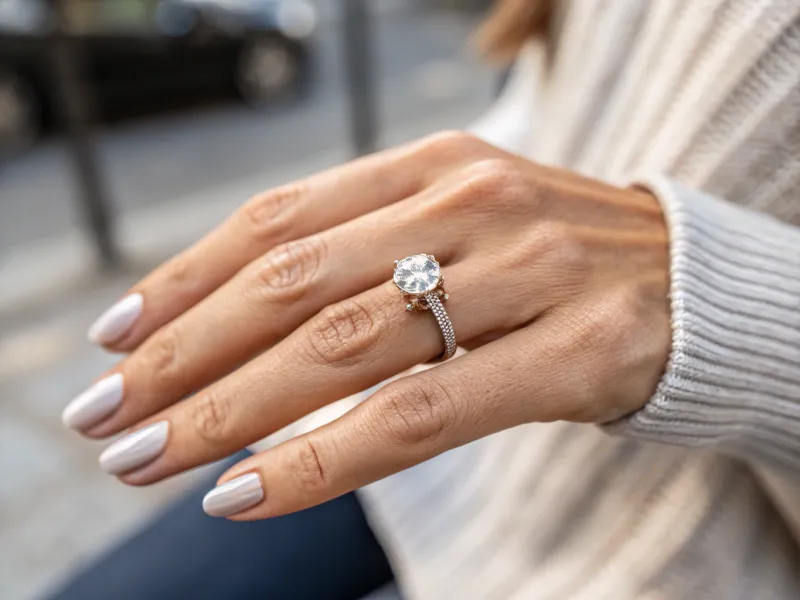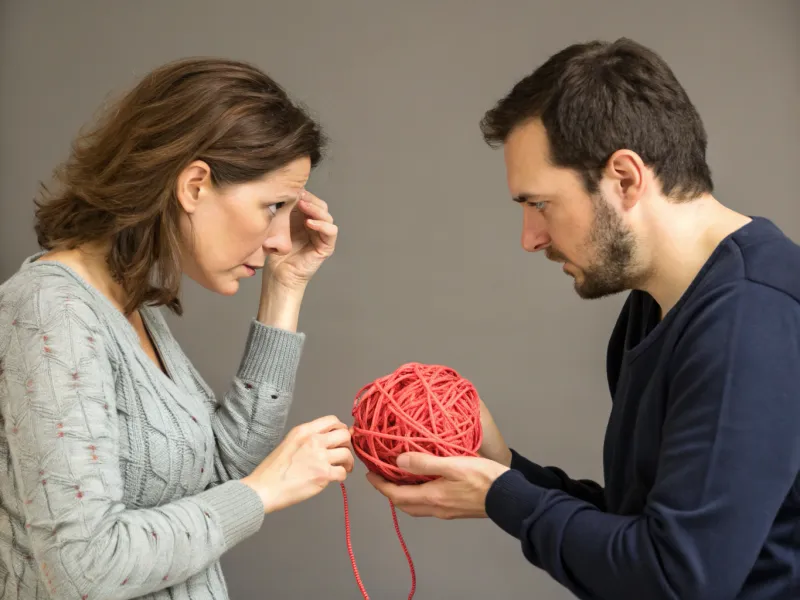30 Red Flags to Watch for When Dating a Divorced Woman
We’ve all been there—navigating the tumultuous seas of dating. But when it comes to dating a divorced woman, there are particular red flags you might want to keep an eye on. It doesn’t mean every divorced woman carries these flags; rather, it’s about being aware and making informed choices. So, let’s chat about signs that might indicate it’s time to hit the brakes or proceed with caution. Remember, forewarned is forearmed!
1. Talks Constantly About Her Ex

When every conversation somehow loops back to her ex, it might be time to hit pause. Constant chatter about the ex might mean she’s not yet healed from her previous relationship. It’s like trying to enjoy a new book while someone keeps reciting lines from the old one.
Don’t get me wrong, it’s natural for her past to surface occasionally, especially if they share kids or mutual friends. But if her ex’s name pops up more often than new topics between you two, it could hint at unresolved feelings.
A friendly suggestion? Try steering conversations toward other interests or future plans. If she resists, it might be worth discussing whether she’s ready to start something new with you.
Related: Dating A Divorced Man: Tips, Tricks And EVERYTHING You Need To Know!
2. Keeps Comparing You to Her Ex

Imagine you’re at a delightful dinner, and suddenly you’re being compared to a ghost from relationships past. Not fun, right? If she’s constantly measuring your actions against her ex’s, it might feel like you’re in a competition you didn’t sign up for.
Comparisons are often a sign she’s still entangled in her past. It could be about the way he dressed, his job, or even how he loaded the dishwasher. While some might seem trivial, repeated comparisons can chip away at your confidence and patience.
Gently remind her that you’re not her ex and that a fresh start means new perspectives. If she struggles to recognize your individuality, it may be a sign she’s not entirely ready to move forward.
3. Reluctant to Introduce You to Her Friends and Family

If she’s keeping you a secret from her friends and family, it might indicate more than just a need for privacy. While everyone moves at their own pace, a strong hesitancy to introduce you could be a red flag.
This reluctance might stem from fear of judgment or unresolved feelings about her past marriage. It’s crucial to understand her reasons, but prolonged secrecy can hinder relationship growth.
Encourage open conversations about her hesitations. If she can’t pinpoint why she’s holding back or if her reasons seem more about past baggage than current reality, consider whether this relationship is meeting your own needs for transparency and connection.
4. Overly Defensive About Her Past

When simple questions about her past lead to defensive responses, it could signal unresolved issues. It’s like trying to open a book that snaps shut every time you peek inside.
Understanding her history helps build intimacy, but if she treats inquiries like interrogations, it’s worth noting. This defensiveness might be protective armor against past hurt or judgment.
Approach these conversations with empathy and patience. If she remains closed off after your gentle curiosity, this might reflect deeper insecurities that could impact your budding relationship. Consider whether she’s open to growth or stuck in self-preservation mode.
5. Speaks Bitterly About Her Ex

If bitterness laces her every mention of her ex husband, it might hint at unresolved anger. This bitterness can act like a shadow over your relationship, coloring everything with negativity.
It’s natural to have feelings about past relationships, but constant bitterness can prevent her from embracing new beginnings. It’s like trying to paint a new picture with a brush dipped in old, murky colors.
Encourage her to express her feelings but note if she’s resistant to moving past them. If her bitterness seems like it’s here to stay, it could be a sign she’s not ready to let go of past grievances, potentially stalling any progress with you.
6. Has Trust Issues

Trust is the foundation of any relationship, and if it’s shaky from the start, things can get rocky. If she questions your every move or needs constant reassurance, it might reflect deeper trust issues.
Her past experiences might have taught her to be wary, but an inability to trust you can create an exhausting dynamic. It’s like trying to build a tower on sand—it’s bound to collapse without a solid base.
Gently discuss these trust issues and see if she’s willing to work through them. If she isn’t open to addressing her concerns or constantly doubts your intentions, you may need to evaluate if you’re comfortable being her emotional support.
7. Avoids Discussing the Future

When conversations about the future feel like taboo, it might indicate a reluctance to get serious. Avoiding future talk could stem from fear of commitment or not being ready to let go of her past.
While some prefer to live in the moment, a consistent dodge of future plans can suggest emotional unavailability. It’s like planning a trip with no destination in mind—a bit exciting, but ultimately unsatisfying.
Encourage discussions about aspirations and mutual goals. If she consistently pulls back or shows no interest in long-term planning, it could be a sign that she’s not envisioning a future that includes you.
8. Fluctuating Communication Patterns

Inconsistent communication can be confusing and unsettling. If she’s hot and cold with her texts or calls, it might be more than just a busy schedule.
These fluctuations could indicate uncertainty or hesitancy about the relationship. It’s like receiving mixed signals at a traffic light—do you stop, go, or proceed with caution?
Discuss these patterns openly. If she’s willing to find a balance and express what she needs, there’s potential for growth. However, if she continues with unpredictable communication, it may be a sign of deeper indecision about your place in her life.
9. Frequently Cancels Plans

Canceling plans occasionally is understandable, but when it becomes a pattern, it might raise eyebrows. Frequent cancellations can suggest she’s not prioritizing you or the relationship.
While life can be unpredictable, consistently bailing might hint that she’s unsure about investing in this partnership. It’s like booking a flight that keeps getting delayed—frustrating and inconvenient.
Talk about her reasons for the cancellations. If she’s open to making time and shows a genuine interest in finding solutions, great. But if her explanations seem flimsy or she appears indifferent, it might be time to rethink the level of commitment.
10. Still Wears Her Wedding Ring

Holding onto mementos from a past marriage isn’t inherently bad, but if she’s still sporting her wedding ring, it might indicate lingering attachments.
The ring can symbolize unresolved emotions or an unwillingness to fully let go. It’s like trying to start a new chapter while keeping a bookmark in the last one—cumbersome and confusing.
Address the ring’s significance with sensitivity. If she’s open to discussing it and shows signs of moving forward, that’s positive. However, if she insists on wearing it without a clear reason, it may suggest she’s not ready to transition fully into a new relationship.
11. Talks About Marriage Too Soon

If she’s bringing up marriage early in the dating phase, it might be worth exploring why. Jumping into serious talks too soon could indicate she’s trying to replace her previous spouse rather than build a new, unique relationship.
This eagerness might stem from a fear of being alone or pressure to conform to societal norms. It’s like trying to skip to the final chapter of a book without enjoying the story.
Open a dialogue about the pace of the relationship. If her focus remains on the endgame rather than the journey, it could be a sign she’s not ready to appreciate what’s presently unfolding between you two.
12. Maintains Close Ties with Her Ex’s Family

Having a cordial relationship with an ex’s family isn’t unusual, especially if there are children involved. However, if she spends significant time with them without clear reasons, it might hint at lingering attachments.
This comfort zone can act as a barrier to fully engaging in a new relationship. It’s like trying to plant new roots in an old garden—challenging and potentially fruitless.
Discuss her relationship with the ex’s family. If she values them more than building connections with your circle, it may be time to assess whether she’s ready to prioritize a new romantic chapter.
13. Hesitant to Share Financial Details

Financial transparency is key in any serious relationship. If she’s hesitant to discuss money matters or share financial details, it might reflect deeper trust or control issues.
Her past experiences might make her wary, but continued reluctance can hinder mutual understanding and growth. It’s like trying to solve a puzzle without all the pieces—frustrating and incomplete.
Encourage open discussions about finances. If she’s willing to address her fears and work toward transparency, that’s a positive sign. However, if she remains secretive, consider whether this aligns with your expectations for financial partnership.
14. Blames Her Ex for All Past Problems

It’s easy to point fingers, but if she consistently blames her ex for all their past woes, it might indicate a lack of self-reflection.
Blame can create a skewed narrative, preventing her from learning and growing from past experiences. It’s like trying to watch a movie with only one scene—limited and lacking depth.
Encourage her to explore both sides of the story. If she’s unwilling to see her own role in past dynamics, it may suggest she’s not prepared to contribute to a balanced, healthy relationship moving forward.
15. Frequently Engages in Drama

If drama follows her like a shadow, it might signal instability. Engaging in frequent conflicts can prevent harmony and growth in a relationship.
Some people thrive in chaos, but constant drama can be exhausting and unproductive, overshadowing genuine moments of connection. It’s like trying to enjoy a sunny day with a persistent storm cloud overhead.
Discuss her need for drama and offer alternatives for conflict resolution. If she’s open to change, there’s hope for a peaceful journey together. However, if she clings to the chaos, consider whether you’re prepared for a partnership filled with turbulence.
16. Expects You to Fix Her Problems

If she’s looking to you to solve all her troubles, it might indicate a dependency issue. Relationships should be about mutual support, not one-sided problem-solving.
While offering help is natural, consistently playing the role of fixer can lead to imbalance. It’s like trying to balance scales with weight only on one side.
Encourage her to address her challenges independently. If she’s open to growth and self-reliance, it bodes well for a balanced partnership. However, if she continues to offload her burdens onto you, it might suggest she’s not ready for an equal relationship dynamic.
17. Has an Unclear Relationship with Her Past

If her past seems like a mystery novel with missing pages, it might indicate unresolved issues. An unclear relationship with her history can impact the foundation of your relationship.
Understanding where she’s been can help navigate where you’re going. But if her past feels like a locked room you’re not allowed to enter, it’s concerning. It’s like trying to follow a map with missing directions.
Encourage open discussions about her history. If she’s willing to share and explore her past, it’s a positive step. However, if she avoids clarity and transparency, reconsider whether you’re comfortable moving forward without understanding her full story.
18. Often Plays the Victim

Playing the victim can be a defense mechanism, often hindering personal growth. If she regularly paints herself as the wronged party, it may indicate a lack of accountability.
This mentality might prevent her from addressing her own role in past conflicts. It’s like watching a play where only one character gets all the sympathy—unbalanced and oversimplified.
Encourage conversations about responsibility. If she’s open to reflecting on her actions and growing from them, that’s promising. However, if she remains in victim mode, consider whether you’re prepared for a relationship where self-awareness is lacking.
19. Reluctant to Open Up Emotionally

Emotional openness is key to intimacy. If she’s closed off, it might indicate fear of vulnerability or unresolved trauma.
Building a connection requires trust and sharing, but if she’s hiding behind emotional walls, it’s challenging. It’s like trying to enter a house with locked doors—frustrating and limiting.
Encourage a safe space for sharing feelings. If she’s willing to open up gradually, it bodes well for deepening the relationship. However, if she remains guarded, assess whether you’re comfortable with limited emotional availability.
20. Shows Signs of Jealousy

Jealousy can be destructive. If she’s showing signs of envy or suspicion without cause, it might reflect deeper insecurities.
While some jealousy is natural, unchecked suspicion can erode trust and intimacy. It’s like trying to enjoy a garden while constantly fearing weeds.
Discuss these feelings openly and work on building trust. If she’s willing to address her insecurities and communicate, there’s potential for growth. However, if jealousy continues to dominate, consider whether you’re ready for a relationship fraught with mistrust.
21. Clings to Old Habits

Old habits die hard, but clinging to them might indicate resistance to change. If she’s stuck in patterns from her previous marriage, it could hinder the growth of your relationship.
It’s like trying to wear shoes that no longer fit—uncomfortable and impractical. Embracing new ways can bring fresh energy into a relationship.
Encourage exploring new experiences together. If she’s open to letting go of outdated habits, there’s potential for renewal. However, if she remains entrenched in the past, consider whether you’re prepared to deal with repetitive dynamics.
22. Questions Your Motives Constantly

Constantly questioning your motives can reflect mistrust or fear of being hurt again. If she’s always searching for hidden agendas, it might indicate deeper insecurities.
A relationship needs trust to flourish, and constant scrutiny can be exhausting. It’s like walking on eggshells—tense and uncomfortable.
Address these concerns and work on establishing trust. If she’s willing to understand and accept your intentions, it’s a good sign. However, if her doubts persist, consider whether you’re comfortable in a relationship shadowed by suspicion.
23. Keeps Mementos of Her Ex

Holding onto memories of the past isn’t necessarily bad, but if her space is filled with keepsakes from her ex, it might suggest lingering attachments.
Mementos can act as emotional anchors, preventing her from fully engaging in the present. It’s like trying to sail a ship with an anchor still in the water.
Discuss the significance of these items. If she’s open to creating new memories and reducing reliance on the past, that’s positive. However, if she clings to these mementos, it may indicate she’s not ready for a new chapter.
24. Avoids Conflict Resolution

Avoiding conflict resolution can stall relationship growth. If she sidesteps issues rather than addressing them, it might reflect a fear of confrontation or unresolved trauma.
Conflict can be healthy if navigated constructively, but avoidance can lead to festering resentment. It’s like ignoring a leaky roof—problems only escalate over time.
Encourage open dialogue and constructive problem-solving. If she’s willing to work through conflicts, it’s a good sign. However, if she continues to avoid issues, consider whether you’re prepared for a relationship lacking in resolution skills.
25. Remains Overly Attached to Her Ex’s Social Circle

Maintaining connections with an ex’s social circle isn’t uncommon, but if she’s overly attached without good reason, it might suggest unfinished business.
These ties can blur the boundaries between past and present, complicating new relationships. It’s like trying to start a new story while still reading chapters from the old.
Discuss her need for these connections. If she’s open to balancing old ties with new ones, that’s promising. However, if she prioritizes her ex’s circle, assess whether she’s ready for fresh social dynamics.
26. Overly Critical of Your Actions

If she’s nitpicking your every move, it might reflect her own insecurities or unresolved issues with her past. Constant criticism can erode self-esteem and trust.
A relationship should be a safe space for growth, not judgment. It’s like trying to grow a plant in hostile soil—challenging and unrewarding.
Address her critical nature and encourage understanding. If she’s open to recognizing and changing her behavior, there’s hope. However, if criticism remains a staple, consider whether you’re comfortable with such scrutiny.
27. Still Has Emotional Ties to Her Ex

Remaining emotionally tied to an ex can hinder new relationships. If she frequently reminisces or gets emotional about her past, it might indicate unfinished feelings.
These ties can prevent her from fully investing in the present. It’s like trying to fill a new cup while another is still half full.
Discuss her emotional connections to the past. If she’s willing to address and resolve these ties, it’s a positive step forward. However, if she clings to them, consider whether she’s ready to commit to a new emotional journey.
28. Unpredictable Mood Swings

Sudden mood changes can be challenging to navigate in a relationship. If she experiences frequent mood swings, it might indicate underlying stress or unresolved issues.
These swings can create a turbulent environment, making emotional stability difficult. It’s like trying to sail in a storm—unpredictable and exhausting.
Encourage discussions about emotions and stressors. If she’s open to understanding and managing her moods, it’s a positive sign. However, if mood swings persist without resolution, consider whether you’re prepared for an emotionally tumultuous relationship.
29. Hesitant to Commit

Commitment can be daunting, especially after a past experience. If she hesitates to commit, it might reflect fear of repeating mistakes.
While caution is understandable, prolonged indecision can stall relationship progress. It’s like trying to drive with the parking brake on—slow and frustrating.
Discuss her fears and hopes for the future. If she’s willing to explore commitment, that’s encouraging. However, if hesitation remains, consider whether you’re comfortable with the uncertainty.
30. Prioritizes Independence Over Partnership

Independence is admirable, but if she prioritizes it over building a partnership, it might suggest she’s not ready for a committed relationship.
Balancing independence with connection is vital for growth. It’s like trying to dance alone at a party meant for couples—fun, but potentially isolating.
Encourage discussions about balance and partnership. If she’s open to integrating independence with connection, it’s promising. However, if she continues to prioritize independence at the expense of partnership, reassess whether your goals align.







